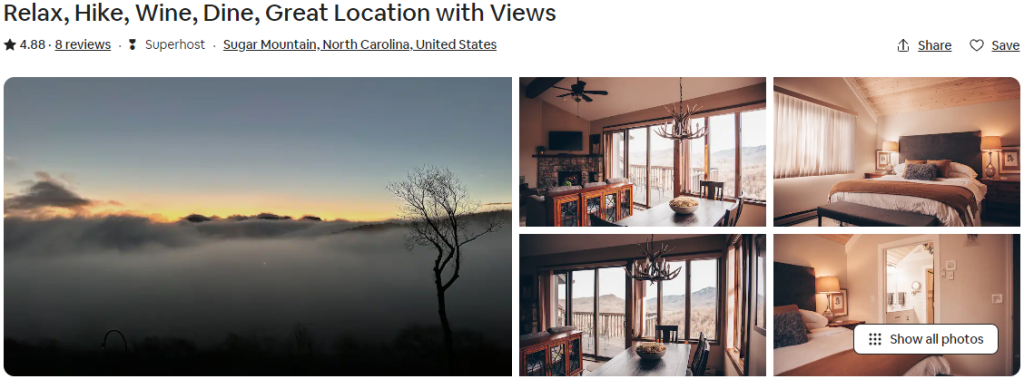
Welcome to the world of Airbnb, where unique stays and unforgettable experiences await! If you haven’t heard of Airbnb yet, prepare to have your travel plans revolutionized. Gone are the days of cookie-cutter hotel rooms and predictable vacations. With Airbnb, travelers now have access to a global network of accommodations that range from cozy apartments in bustling cities to treehouses nestled deep in the woods. But how did this game-changing platform come into existence? And what impact has it had on the travel industry as a whole? Join us as we delve into the fascinating story behind Airbnb’s rise to success and explore how it has forever changed the way we travel. Whether you’re an avid wanderer or simply curious about alternative lodging options, this blog post will provide you with valuable insights into why Airbnb is more than just a place to stay – it’s an innovative force that has reshaped the way we experience vacations. So sit back, relax, and let’s embark on this exciting journey together.
What is Airbnb?
What is Airbnb, you ask? Well, it’s not just your typical hotel booking website. In fact, it’s far from it. Founded in 2008 by Brian Chesky and Joe Gebbia, Airbnb is an online marketplace that connects people looking for unique accommodations with hosts who are willing to rent out their spaces.
But what sets Airbnb apart from traditional hotels? For starters, the options are endless. Whether you’re dreaming of a beachfront villa or a cozy cabin in the mountains, chances are there’s an Airbnb listing that matches your desires.
Another key aspect of Airbnb is its emphasis on personalization and local experiences. Staying at an Airbnb allows travelers to immerse themselves in the culture of their destination and live like a local – something that can be hard to achieve when staying at a generic hotel chain.
Not only does this give travelers a more authentic experience, but it also fosters connections between guests and hosts. Many hosts go above and beyond to provide recommendations for local attractions, restaurants, and hidden gems – turning strangers into friends along the way.
In addition to offering diverse accommodations and insider knowledge about destinations, using Airbnb can often be more budget-friendly than traditional hotels. With options ranging from budget rooms to luxury villas, there’s something for every traveler’s wallet.
So whether you’re seeking adventure or simply craving a home away from home during your travels, consider giving Airbnb a try. With its wide range of unique stays and personalized experiences waiting to be discovered around the world, you may never look at travel accommodations the same way again.
How did Airbnb get started?
In the early days of Airbnb, founders Brian Chesky and Joe Gebbia were struggling to pay their rent in San Francisco. They had an idea: they would turn their living room into a bed and breakfast for attendees of a design conference coming to town. With just three air mattresses, they created the first “Airbed and Breakfast” experience.
The concept took off, attracting travelers who were tired of impersonal hotels and looking for unique, authentic experiences. Chesky and Gebbia soon realized they were onto something bigger than just renting out air mattresses – they were revolutionizing the way people travel.
They enlisted the help of Nathan Blecharczyk as a technical co-founder, and together they launched Airbnb in 2008. The platform allowed anyone with extra space – whether it be a spare bedroom or an entire home – to become hosts and earn money by welcoming travelers from around the world.
Initially met with skepticism from both potential hosts and guests, Airbnb slowly gained traction through word-of-mouth recommendations. As more people embraced the sharing economy, Airbnb expanded its offerings beyond air mattresses to include entire homes, apartments, treehouses, yurts – you name it!
Today, Airbnb has millions of listings in over 220 countries worldwide. It has not only disrupted the traditional hotel industry but also unlocked new opportunities for homeowners seeking additional income streams.
By connecting travelers directly with local hosts, Airbnb has provided a platform for cultural exchange that goes beyond simply finding a place to stay. Travelers can now immerse themselves in local communities while supporting individual entrepreneurs.
While critics argue that hosting on Airbnb may lead to increased housing costs or detract from traditional tourism industries like hotels, there’s no denying that this innovative approach to accommodations has changed how we think about travel.
So next time you’re planning your vacation or even just need a weekend getaway closer to home,
consider giving Airbnb a try – you might find yourself staying in some truly unforgettable places.
How has Airbnb changed the travel industry?
How has Airbnb changed the travel industry? Let’s take a look at some of the ways this platform has revolutionized how people travel.
First and foremost, Airbnb has disrupted the traditional hotel industry. Gone are the days when travelers were limited to staying in expensive hotels or budget motels. With Airbnb, individuals can now choose from a wide range of unique accommodations that suit their preferences and budgets. From cozy apartments in city centers to luxurious villas by the beach, there is something for everyone on Airbnb.
In addition to providing more options for accommodation, Airbnb has also empowered homeowners to monetize their extra space. This means that travelers can now stay in neighborhoods they may have otherwise never considered, experiencing local culture firsthand while supporting local communities.
Another way Airbnb has transformed travel is by fostering connections between hosts and guests. Unlike impersonal hotel stays, many hosts go above and beyond to provide personalized recommendations and insider tips on exploring the destination like a local. This not only enhances the overall travel experience but also builds meaningful relationships between people from different backgrounds.
Moreover, Airbnb offers flexibility when it comes to trip planning. Travelers can book accommodations for any duration – whether it’s a weekend getaway or an extended vacation – without being tied down by rigid check-in/check-out times commonly found in hotels.
Furthermore, affordability plays a significant role in why many travelers opt for Airbnb over traditional accommodations. By cutting out middlemen and overhead costs associated with running large hotel chains, prices on Airbnb tend to be more competitive.
One cannot overlook the positive environmental impact of using platforms like Airbnb. By utilizing existing spaces instead of constructing new buildings solely dedicated to lodging purposes, we reduce our carbon footprint significantly.
All these factors combined make it clear that Airbnb has truly transformed how people approach travel experiences today. Whether you’re looking for authenticity, affordability or simply wanting to connect with locals during your travels; this innovative platform continues shaping the future of tourism as we know it.

Pros and cons of using Airbnb
Pros and Cons of Using Airbnb
When it comes to finding accommodation for your next vacation, Airbnb has become a popular choice for travelers around the world. But like any platform, there are both pros and cons to using Airbnb.
One of the biggest advantages of using Airbnb is the variety of options available. From cozy apartments in bustling cities to beachfront villas or even treehouses nestled in nature, you can find unique and one-of-a-kind accommodations that may not be available through traditional hotels. This allows you to have a more personalized and authentic experience during your stay.
Another benefit is cost savings. In many cases, staying at an Airbnb can be more affordable than booking a hotel room, especially if you’re traveling with a group or planning an extended stay. Additionally, having access to kitchen facilities in some rentals can help save money on dining out.
Flexibility is also a major advantage with Airbnb. You have the option to choose from various check-in times and often have more freedom when it comes to cancellation policies compared to hotels. This flexibility can be particularly valuable if your travel plans change unexpectedly.
However, it’s important to consider some potential drawbacks as well. One common concern is safety since you’re essentially staying in someone else’s home or property. While most hosts on Airbnb are reputable and provide accurate descriptions of their listings, there have been isolated incidents reported by guests.
Another disadvantage is inconsistent quality standards across different properties listed on the platform. Some rentals might not meet your expectations in terms of cleanliness or amenities provided despite positive reviews from previous guests.
Communication with hosts can sometimes be challenging depending on their responsiveness and availability during your stay.
In conclusion,
Using Airbnb has its benefits such as providing unique accommodations at lower costs while offering flexibility for travelers’ needs; however, safety concerns regarding staying in someone else’s property should always be taken into consideration along with potential inconsistencies between listings’ actual conditions versus advertised features
Are there any alternatives to Airbnb?
Are there any alternatives to Airbnb? While Airbnb is undoubtedly a popular choice for travelers seeking unique and affordable accommodations, it’s always good to explore other options. Here are some alternative platforms that offer similar services:
1. Vrbo (Vacation Rentals By Owner): Vrbo is one of the largest vacation rental websites, with over 2 million listings worldwide. It offers a wide range of properties, from cozy cabins in the woods to luxurious beachfront villas.
2. Booking.com: Although primarily known for hotel bookings, Booking.com also features a variety of vacation rentals and apartments. With its extensive inventory and user-friendly interface, it’s worth checking out for those who prefer more traditional hospitality options.
3. HomeAway: HomeAway is another well-established platform that connects travelers with property owners offering short-term rentals. Whether you’re looking for an urban loft or a rustic countryside cottage, HomeAway has something for everyone.
4. FlipKey: Owned by TripAdvisor, FlipKey specializes in vacation rentals around the world, boasting thousands of unique properties available for rent directly from their owners or managers.
5. Homestay: For those seeking an authentic local experience, Homestay allows travelers to stay with host families in their homes while immersing themselves in the culture and traditions of their destination.
Remember that each platform has its own strengths and weaknesses when compared to Airbnb, so take your time to research and find the best fit based on your travel preferences.

Conclusion
Airbnb has undoubtedly revolutionized the travel industry with its unique approach to accommodation and personalized experiences. What started as a simple idea to rent out an air mattress in someone’s living room has evolved into a global phenomenon that offers travelers an alternative to traditional hotels and resorts.
By connecting hosts with travelers from around the world, Airbnb has created a community of trusted individuals who open their doors and share their spaces. This not only provides more options for accommodations but also allows travelers to experience new cultures, immerse themselves in local neighborhoods, and create meaningful connections along the way.
The benefits of using Airbnb are clear – affordability, flexibility, and the opportunity for authentic experiences. From cozy apartments in bustling city centers to secluded villas overlooking breathtaking landscapes, there is something for every traveler’s taste and budget.
However, it is important to consider some potential drawbacks when using Airbnb. While most hosts strive to provide excellent hospitality, there is always a possibility of encountering unforeseen issues or less-than-ideal accommodations. Additionally, regulations surrounding short-term rentals vary by location, which may result in legal complications or restrictions in certain areas.
Whether you’re looking for a budget-friendly option or craving an immersive travel experience off the beaten path – Airbnb remains at the forefront of transforming how we explore destinations worldwide. With its vast selection of unique stays combined with ease-of-use technology platform – it’s no wonder why millions of people continue turning towards this innovative service when planning their trips.
So why wait? Embrace the spirit of adventure and start your journey through Airbnb today! Whether you’re embarking on a solo escapade or planning a group getaway – let this game-changing platform be your guide to unforgettable travel experiences. Happy travels!






